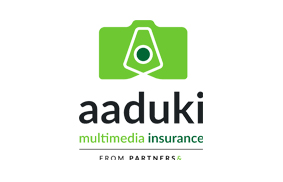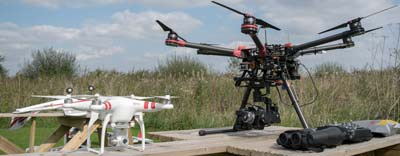I am thinking of buying a Drone to use - what are the insurance implications?
 If there is one area of professional photography that is set to "take
off" on a huge scale this year it will be the use of unmanned drones for
aerial photographic and video work. The use of a drone or UAV (Unmanned
Aerial Vehicle) gives the owner of such a system a distinct selling
advantage with opportunities of still images and video media ranging from
Weddings and Estate Agency to Environmental and Agricultural work.
If there is one area of professional photography that is set to "take
off" on a huge scale this year it will be the use of unmanned drones for
aerial photographic and video work. The use of a drone or UAV (Unmanned
Aerial Vehicle) gives the owner of such a system a distinct selling
advantage with opportunities of still images and video media ranging from
Weddings and Estate Agency to Environmental and Agricultural work.
However put in simple terms UAVs can be classed the same way as any other
aircraft. The perils of a drone colliding with a passenger aircraft or
falling out of the sky into a wedding party with propellers whirling are bad
enough, if you don't have the right insurance cover but what if you didn't
have permission to fly anyway? Photographers should be thinking of joining
bodies such as SUAS (Society for Unmanned Aerial Systems) to keep up to date
with all the rules and regulations of the CAA (Civil Aviation Authority) or
in Ireland the IAA (Irish Aviation Authority).
Regulations set out in the UK's Air Navigation Order state that, for safety
reasons, a license is needed to operate a drone to make money. Any business
or person operating an unmanned aircraft for commercial use requires
Permission from the CAA. Photographers who ignore this and use drones
without a license for commercial purposes are potentially landing themselves
with a fine of up to £5,000.
Obtaining a CAA license involves attending ground school on air law and
navigation and completing a practical flight assessment. A list of approved
operators is available on the CAA's website so customers commissioning
aerial work can check if an operator has CAA's permission.
EU regulations state that as a minimum all UAV operators should have the
appropriate third party liability in place. The likelihood is that the
Public Liability for your general insurance policy does not cover aerial
work and you are strongly advised to check your current policy very
carefully.
Vince Brown of Aaduki insurance argues "With the huge opportunities for
photographic and video work offered by drones it is worrying to think that
many insurers will not cover this aspect of a photographer's work, so no-one
should assume that they have this cover. It is best to check now before an
accident happens that causes damage or injury. We have launched Aaduki Air
to provide insurance specifically arranged with UAV users in mind."

This area is an absolute minefield from not only standard Public Liability
but includes factors such as the weight of the machine, your experience,
where you intend to fly and the safety systems on the machine. In other
words a specifically tailored insurance policy to your own business is an
essential requirement and you should make sure you are a member of a
professional body that can represent your interests and advise you on
concerns that may arise.
Matt Paczkowski runs AirPixa.co.uk and travels all over the country using his
UAVs for commercial photography and videography.
"We have seen a number of photographers that bought themselves small
machines and use them commercially." he says "That's not only illegal, but
also dangerous to the public and their customers. They are very unlikely to
be aware of their drone's limitations (as they haven't had appropriate
training) and any air regulations, airspace and insurance requirements etc.
" This is like having your boiler fitted or serviced by a non Gas Safe
registered individual.
To sum up, most photographers wouldn't dream of taking an assignment on
terra firma without being fully covered by insurance and making sure they
are not trespassing or acting illegally in any way. Just because drones are
operated in the air doesn't mean all of these cautions should be abandoned.
Ignorance may be bliss but in this case it's also very, very dangerous.
Image courtesy of
www.airpixa.co.uk.
www.airpixa.co.uk
www.aaduki.com/
www.suas-global.com
www.caa.co.uk
Call us on 020 3633 2280 for more advice or if you have a specific question.









